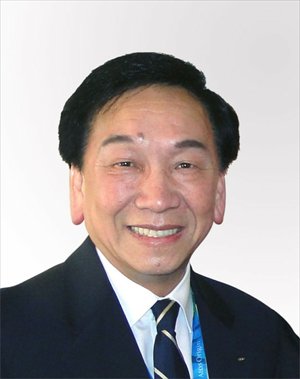Olympic dreams go beyond just sports
Editor's Note:
Wu Ching-Kuo (Wu), president of the International Boxing Association (AIBA) and member of the Executive Board of the International Olympic Committee (IOC), declared in May that he would run for president of the IOC this September. As the first Chinese candidate for this top position, Wu, who is from Taiwan, shared his thoughts with Global Times (GT) reporter Liu Zhun on his governing philosophy, competitive advantages, plans for future work, and dedication to improve the cross-Straits communications.

Wu Ching-Kuo
GT: What are your advantages in the election of the IOC presidency?
Wu: I have been serving the Olympic movement for over 25 years, which makes my tenure the longest among all the six candidates. My extensive experience in the IOC and AIBA will constitute my competitive advantages in this election.
Over nearly three decades, I have worked in nine IOC commissions, and spent much of the time committing myself to culture and education.
My efforts as AIBA president have been conspicuously productive. Before I assumed the presidency, boxing had been marginalized for a long time. After comprehensive reforms under my direction, AIBA has successfully swept this haze aside.
Extensive problems, such as financial non-transparency, match-fixing, and corruption, were all properly addressed.
More importantly, these reforms served as a precursor to the successful inclusion of women's boxing in the London 2012 Olympic Games. A transparent, influential and well-respected AIBA is back on track.
I have also established three Olympic museums in China.
These museums are designed to publicize the Olympic spirit, which I have been continuously dedicated to carrying forward with great passion in my Olympic career.
GT: What aspects of global sports development should the IOC further improve? And what's your plan to get this work done?
Wu: In the last 33 years, the late president Juan Antonio Samaranch and incumbent President Jacques Rogge have achieved great success in addressing the problems of global sports and improving the image of the IOC and the Olympic Games.
Despite the successes, we are still facing some problems jeopardizing the development of sports. Doping, illegal betting and match-fixing are still disturbing. I believe that education is key to resolving these problems.
Education plays a fundamental role in recovering the corrupted values. People should be convinced that moral principles instead of selfish interests will prevail. Equality, fair play, and devotion should be embedded in the minds of the people, especially the younger generation.
If I am elected, I will call for education ministers around the world to discuss how to integrate the values of the Olympics into school education and inspire the young generations with righteousness and fairness.
It should be kept in mind that the Olympic Games and other events must always be a high-level and honest stage for athletes to compete.
GT: Can you expatiate about your philosophy in leading the IOC if you are elected?
Wu: I think it is time that the IOC and the Olympic movement as a whole go beyond Olympism and play a proactive and leading role for the betterment of humanity.
Sport is currently the most effective approach to bring together people of the world, and the IOC, on behalf of the universal values of the Olympics, can make massive contribution to the public interests, such as promoting world peace and education and tackling the problem of poverty.
If my visions are realized, I believe the IOC will play a more positive and responsible role internationally.
GT: What influence will your election make to the development of Chinese sports and how will it impact communications, especially in sports, across the Taiwan Straits?
Wu: It's a great pride and honor that I can be the first Chinese candidate for the presidency. China is the most populous country in the world. Chinese cannot be absent from the governance of the IOC, where I have confidence that we can do even better, especially in leadership, than before.
China has managed to enormously promote its sports industry, whose achievements are admittedly remarkable worldwide. If I am elected, I will continue to render full support to China in the escalation of its image in the international sporting community.
As for the communication between the two sides across the Straits, I would like to stress the significance of one principle. The people from both sides are all Chinese, and Chinese are destined to help each other. Mutual support and reciprocal communication are the best approaches to enhance the cross-Straits relations.
And I am very pleased to act as a liaison through the platform of the IOC to promote comprehensive communication between the two sides.
GT: Why did you promise that you are not going to ask for a second term if you are elected?
Wu: Eight years is enough, and 12 years is too long. I am sure that my objectives as IOC president will be accomplished in one term. And I am willing to leave more opportunities for other younger and capable members.
It's like I am setting a deadline for my work, and I am confident that I will carry forward my visions, as I promised, and realize the established goals within the permitted period.
GT: To be more precise, you are representing Chinese Taipei to run for the IOC president. Will your campaign be impacted by some political factors?
Wu: I need to emphasize that the election of the IOC president is not a political one. The IOC firmly holds a stance of being free from political interference.
Every member of the IOC is independent from the others, and the voting is held by secret ballot. Their righteousness and integrity guarantee that they will vote for the candidate whose performance and personality are convincing enough to make him or her a qualified leader.
Where I come from does not matter, and what really matters is whether I can fulfill my promises and make my contribution to the development of the global sports.